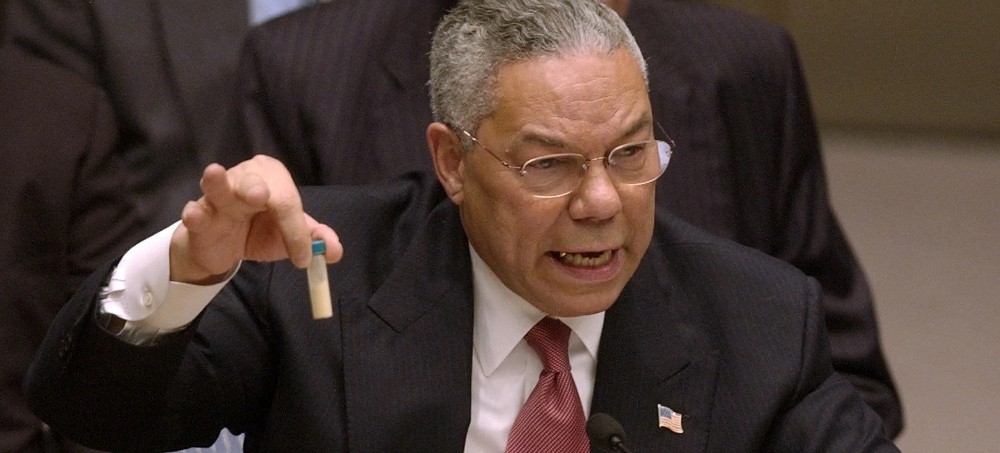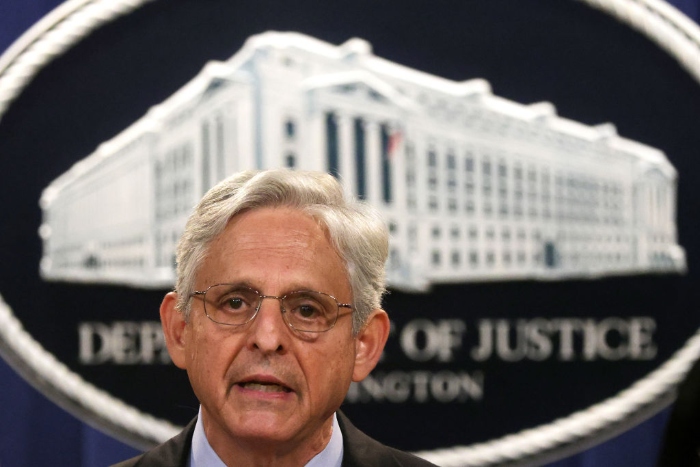Live on the homepage now!
Reader Supported News
Ten years ago this week, a defining moment occurred in the Bush administration’s push to invade Iraq. On Feb. 5, 2003, then-Secretary of State General Colin Powell addressed the United Nations Security Council. His message was clear: Iraq possessed extremely dangerous weapons of mass destruction and Saddam Hussein was systematically trying to deceive U.N. inspectors by hiding prohibited weapons. A decade later, we host a debate between Powell’s former aide, Col. Lawrence Wilkerson — who prepared the U.N. speech, only to later renounce it — and media critic Norman Solomon, author of “War Made Easy.” “I don’t believe the hype about that presentation having been the ultimate presentation … that led us to war with Iraq,” Wilkerson says of Powell’s speech. “George W. Bush, Dick Cheney and others had decided to go to war with Iraq long before Colin Powell gave that presentation. … It added to the momentum of the war. … Frankly, we were all wrong. Was the intelligence politicized in addition to being wrong at its roots? Absolutely.” In response, Solomon says, “We were not all wrong. As a matter of fact, many experts and activists and researchers, from the get-go, in 2002, were saying that the administration case for weapons of mass destruction in Iraq was full of holes. … So, now to say, 'Well, it wasn't just us at the administration; other people believed it,’ people believed it because they were propagandized by the administration, with massive assistance from the mass media.”
SECRETARY OF STATE COLIN POWELL: One of the most worrisome things that emerges from the thick intelligence file we have on Iraq’s biological weapons is the existence of mobile production facilities used to make biological agents. Let me take you inside that intelligence file and share with you what we know from eyewitness accounts. We have firsthand descriptions of biological weapons factories on wheels and on rails. The trucks and train cars are easily moved and are designed to evade detection by inspectors. In a matter of months, they can produce a quantity of biological poison equal to the entire amount that Iraq claimed to have produced in the years prior to the Gulf War.
AARON MATÉ: That was then-Secretary of State Colin Powell speaking at the U.N. February 5th, 2003. Powell also estimated Iraq had a stockpile of between 100 and 500 tons of chemical weapons agent. All of his claims about weapons of mass destruction turned out to be false.
AMY GOODMAN: But at the time, most of the media took Powell at his word. The day after Powell’s speech, The New York Times ran an editorial called “The Case Against Iraq.” It said Powell’s performance was, quote, “all the more convincing because he dispensed with apocalyptic invocations of a struggle of good and evil and focused on shaping a sober, factual case against Mr. Hussein’s regime,” unquote. The Washington Post titled its editorial “Irrefutable” and declared, quote, “it is hard to imagine how anyone could doubt that Iraq possesses weapons of mass destruction,” unquote. Well, the invasion began six weeks after Powell made his speech at the U.N.
For more, we’re joined by two people. From Oklahoma City, we’re joined by Colonel Lawrence Wilkerson. He served as chief of staff to Secretary of State Colin Powell from 2002 to 2005. He helped prepare Powell’s infamous U.N. speech, which he has since renounced. And from San Francisco, California, we’re joined by Norman Solomon, founding director of the Institute for Public Accuracy, also wrote the book War Made Easy: How Presidents and Pundits Keep Spinning Us to Death.
We welcome you both to Democracy Now! Colonel Lawrence Wilkerson, let’s begin with you. You really were responsible for putting this speech together for Secretary of State Powell. It’s 10 years later. What are your thoughts today? Where did you get your information?
COL. LAWRENCE WILKERSON: First of all, Amy, I don’t believe that the hype about that presentation having been the ultimate presentation, as it were, that led us to war with Iraq. George W. Bush, Dick Cheney and others had decided to go to war with Iraq long before Colin Powell gave that presentation. That said, that presentation was a moment in time that convinced a lot of people, in America first, in the international community, maybe even on the U.N. Security Council in one or two cases, that they had been previously wrong to doubt that he had weapons of mass destruction. And in that sense, it added to the momentum of the war. President Bush himself has written in his book, had he known that there were no WMD, he might have made a different decision. I don’t think Richard Cheney would have made a different decision. But it wasn’t the seminal moment that sent us into war; it was just one of those moments. And as one of those moments, as I’ve said before and as you quoted me, I feel like it was the lowest point in my professional and personal life that I had a hand in managing it.
AMY GOODMAN: How did you—where did the information come from? Explain how you did put this together.
COL. LAWRENCE WILKERSON: The information came from, in our intelligence system at the time, the 16 entities that compose our intelligence services, and spoken for by the then-master of that intelligence community, George Tenet, the director of Central Intelligence, and vouchsafed multiple times by his deputy, the DDCI, John McLaughlin. But it came from a much wider array, Amy. It came from Israel. It came from France. It came from Jordan. It came from Germany. Indeed, it came from almost every intelligence service that, at one time or another, had fed into the U.S. process with regard to Iraq. And frankly, we were all wrong. Was the intelligence politicized in addition to being wrong at its roots? Absolutely. And the leader of that politicization was the vice president of the United States, Richard Cheney.
AARON MATÉ: Now, Colonel, you’ve talked about how some of the intelligence actually came from torture. Can you tell us about that?
COL. LAWRENCE WILKERSON: The seminal moment, as we were out at Langley and Colin Powell was getting ready to throw everything out of his presentation that had anything to do with terrorism—that is, substantial contacts between Baghdad and al-Qaeda, in particular—as he was getting—he was really angry. He took me in a room by myself and literally attacked me over it. And I said, “Boss, let’s throw it out. I have as many doubts about it as you do. Let’s throw it out.” And so, we made a decision right there to throw it out.
Within 30 minutes of the secretary having made that decision and instructed me to do so, George Tenet showed up with a bombshell. And the bombshell was that a high-level al-Qaeda operative, under interrogation, had revealed substantial contacts between al-Qaeda and Baghdad. In fact, they included al-Qaeda being trained by the Mukhabarat, the secret police of Iraq, in how to use chemical and biological weapons. This was—this was a bombshell.
Only later—much later—did we learn that this information came from Shaykh al-Libi, who was waterboarded, probably in Cairo, with no U.S. personnel present. We also learned that, within days of his having given this information under torture, he recanted. We learned also that the Defense Intelligence Agency, having seen that recantation and having seen other data about how the information was obtained in the first place, had issued a burn notice on it. That is to say, this is worthless; don’t pay any attention to it. Later, George Tenet would say that due to a computer glitch, that burn notice, that DIA statement not to trust al-Libi, never was revealed to the secretary.
AMY GOODMAN: I want to turn to a clip from Norman Solomon’s film, War Made Easy, about Colin Powell’s address and the media’s response. The film was narrated by Sean Penn. The clip begins with former President George W. Bush.
PRESIDENT GEORGE W. BUSH: Secretary of State Powell will present information and intelligence about Iraqis’ illegal—Iraq’s illegal weapons programs, its attempts to hide those weapons from inspectors, and its links to terrorist groups.
SEAN PENN: The failure of American news media to check government distortion reached new heights when, on the eve of war, the highly respected Secretary of State Colin Powell appeared before the United Nations to make the case that there were weapons of mass destruction in Iraq.
SECRETARY OF STATE COLIN POWELL: Saddam Hussein’s intentions have never changed. He is not developing the missiles for self-defense. These are missiles that Iraq wants in order to project power, to threaten, and to deliver chemical, biological and, if we let him, nuclear warheads.
AARON BROWN: Today, Secretary of State Powell brought the United Nations Security Council the administration’s best evidence so far.
NORMAN SOLOMON: After Colin Powell’s speech to the U.N., immediately the U.S. press applauded with great enthusiasm.
AARON BROWN: Did Colin Powell close the deal today, in your mind, for anyone who has yet objectively to make up their mind?
HENRY KISSINGER: I think for anybody who analyzes the situation, he has closed the deal.
SEAN HANNITY: This irrefutable, undeniable, incontrovertible evidence today. Colin Powell brilliantly delivered that smoking gun today. Colin Powell was outstanding today. I mean, it was lockstep. It was so compelling, I don’t see how anybody at this point cannot support this effort.
ALAN COLMES: He made a wonderful presentation. I thought he made a great case for the purpose of disarmament.
MORT KONDRACKE: It was devastating, I mean, and overwhelming. Overwhelming abundance of the evidence. Point after point after point with—he just flooded the terrain with—with data.
CHARLES KRAUTHAMMER: It’s the end of the argument phase. America has made its case.
AMY GOODMAN: An excerpt from the film War Made Easy. Some of the voices from that clip, you might remember, you might recognize: Aaron Brown, Henry Kissinger, Sean Hannity, Alan Colmes, Mort Kondracke, Charles Krauthammer. Norman Solomon, this is from your film, the film based on your book, War Made Easy. So you had Secretary of State Colin Powell pushing for war, and as Colonel Lawrence Wilkerson said, he actually believes, whether or not this speech were made, the U.S. would have attacked Iraq. And you have the media, which is supposed to be the fourth estate, not part of the state. Talk about its role.
NORMAN SOLOMON: Well, we just heard Colonel Wilkerson say that “we were all wrong.” I’m quoting him here from a few minutes ago. In fact, we were not all wrong. As a matter of fact, many experts and activists and researchers, from the get-go, in 2002, were saying that the administration case for weapons of mass destruction in Iraq was full of holes, and many guests on Democracy Now! demolished those claims from the Bush administration in real time. The organization where I work, the Institute for Public Accuracy, put out many news releases documenting the falsities coming from Colin Powell’s office and the entire administration, including the week that he gave his now-infamous speech at the United Nations. We had U.N. weapons inspectors like Scott Ritter and Hans von Sponeck demolishing many of those claims being made, again, in real time.
So, what we’ve heard again today—and I think it’s very disappointing—from the former chief of staff here of Colin Powell is the reiteration of these supposedly exculpatory, actually, excuses for just following orders. And I could condense what Colonel Wilkerson just said about Colin Powell’s role in the lead up to the war in Iraq: “We were just following orders, and Dick Cheney made us to it.” No, Dick Cheney didn’t make you do it. There’s something called resignation. There’s something called speaking up and the First Amendment. There are a lot of dead Americans and many more Iraqis because of the silence and the following of orders when we look at what actually took place.
Now, one of the most important facts is that, 10 years later, an ongoing legacy of Colin Powell’s behavior—and, unfortunately, of our guest, as well, and the entire upper echelons of the Bush administration—is a pattern of impunity—impunity to lie, impunity to deceive and distort, impunity that is personal, that is professional and is governmental. And that kind of impunity, which has caused so much death and misery in Iraq and Afghanistan and elsewhere, is being fast-forwarded, is prefigurative for where we are now. And so, even today, although what’s done is done, we might say, the failure of people like Colin Powell to step up and say, “Look, not only was I wrong, but in planning and implementing aggressive war, I violated the Nuremberg Principles” — if we could get those kind of forthright statements from these former top officials, we could look at the agenda building for war on Iran in a more understanding light.
AMY GOODMAN: Colonel Lawrence Wilkerson, your response?
COL. LAWRENCE WILKERSON: I don’t want to get into an on-screen argument with someone who makes comments as if he’d never been in government a day in his life or never been in—associated with power at this level. But I will say, first of all, that when I said “we,” quote-unquote, I meant those in government, not people like him or Scott Ritter or anybody else who were protesting that Iraq didn’t have WMD at the time.
And when you look at the entire situation and you understand that the Congress of the United States had blessed the October 2002 NIE from which Powell’s presentation emanated; when you look at the president of the United States, the vice president of the United States, the secretary of defense, the Congress; when you look at the American people, who in polls showed 70 percent-plus agreed that Saddam Hussein had WMD, it’s not enough to say that Dick Cheney and Colin Powell and others failed in their responsibility to the American people or to their own government. There were a lot of people—
NORMAN SOLOMON: Yeah, you know, let’s—
COL. LAWRENCE WILKERSON: —that believed that Saddam Hussein had weapons of mass destruction. I’m not trying—
NORMAN SOLOMON: Well, you know, let’s—
COL. LAWRENCE WILKERSON: —to rationalize or excuse. I’m just saying that there were a lot of people who had the same view that Colin Powell basically presented at the United Nations. And those people were in other countries, too—in Israel, in Jordan, in Germany, in France—because they shared their intelligence with us, and they shared their views as to whether or not the DCI, George Tenet, was basically right in asserting that Saddam Hussein still had weapons of mass destruction.
AARON MATÉ: Well, Colonel, when Norman Solomon says—
NORMAN SOLOMON: You know, let’s get real here. You know, let’s get real about this—
AARON MATÉ: OK. Let’s go to Norman Solomon. Go ahead.
NORMAN SOLOMON: —because the public and the media and so many others, who did not, in terms of journalism, serve their basic function, were being fed a continuous barrage of messages from Cheney’s office, from the White House, from the State Department under former General Powell, telling them, insisting, as occurred at the United Nations, that there were weapons of mass destruction. This belief among the public didn’t come from the sky; it came from the administration. We had the Congress passing this green light for war almost four months before the Powell speech at the U.N., because they had been fed and pushed and pulled, and often expediently, they went with this story that had been peddled through the mass media. We had so many networks and newspapers, including The New York Times and The Washington Post, front-paging stuff that was fed to them, duplicitous, mendacious—mendacious stories that were fed by the administration. So, now to say, “Well, it wasn’t just us at the administration; other people believed it,” people believed it because they were propagandized by the administration, with massive assistance from the mass media.
And today we’ve got to look at the reality that we are in a repetition compulsion disorder cycle. After Powell spoke at the U.N., Susan Rice, the current U.N. ambassador from the United States, immediately praised it as a statement from Powell that proved weapons of mass destruction in Iraq. We had bogus hearings from now-Vice President Joe Biden, who chaired the Senate Foreign Relations Committee, excluding testimony from those who had contrary information that would challenge the push to war. We’ve had John Kerry, now Secretary of State, who voted for and propagandized on national television for the invasion of Iraq.
So let’s look at where we are. Tomorrow, a hearing for John Brennan—
COL. LAWRENCE WILKERSON: You’re making my point.
NORMAN SOLOMON: —who is being pushed as a CIA director, someone engaging in aggressive war, the use of drones and so forth. And let me say that my colleagues at RootsAction.org are asking you to sign up at RootsAction.org to challenge that nomination.
AMY GOODMAN: Colonel Lawrence Wilkerson?
COL. LAWRENCE WILKERSON: Now, you’re making my point. I find it very difficult to, in the whole, say that all of those entities that you just described to include the American people were led down the primrose path by the propaganda flowing out of the White House and the Congress and elsewhere. That presents a picture of a pretty purblind, apathetic, ignorant public, representatives in the government and elsewhere. I can’t support that kind of broad-brush painting of the situation.
AMY GOODMAN: There was a million people in the streets protesting.
NORMAN SOLOMON: Where did they get the idea there were weapons of mass destruction? Did they get it from their everyday lives? Did they get it from their PTA? No—
COL. LAWRENCE WILKERSON: They probably got it from the same place a lot of people in the government got it—
NORMAN SOLOMON: —they got it from the administration, that was peddling that line for years as agenda building for war.
COL. LAWRENCE WILKERSON: —which was that Saddam Hussein had weapons of mass destruction, had used them against his own people. No one thought he would get rid of them, since his number-one enemy, Iran, was kept at bay, certainly in part, because he possessed them. I think there was a pretty good feeling across the world, not just in the United States, that Saddam Hussein had weapons of mass destruction. And by the way, there is no question, I don’t think, in anyone’s mind, that once the international sanctions were off Saddam Hussein and once the international focus was off of him, he would go right back to building weapons of mass destruction again, including a pursuit of a nuclear weapon. So, let’s not make this too much of a—of, essentially, a calumny on the American people, their representatives in the Congress and all of those in the government.
NORMAN SOLOMON: It’s not a calumny on the American people at all. It’s an accurate accusation that the administration of George W. Bush, which Colonel Powell—former General Powell and you served—
COL. LAWRENCE WILKERSON: You thought for yourself. You thought for yourself. Why can’t other Americans think for themselves?
NORMAN SOLOMON: —lied and deceived and spun for war continuously. And that’s reality. And the public responded to that.
COL. LAWRENCE WILKERSON: Why weren’t you influential in bringing the American people to believe what you believe?
NORMAN SOLOMON: Well, look—
AARON MATÉ: I wanted to cut in here—
NORMAN SOLOMON: The bully pulpit of the administration—
AARON MATÉ: I wanted to cut in here, Norman Solomon, and actually read from the Downing Street Memo.
NORMAN SOLOMON: —was tremendously effective. We know that was the case.
AARON MATÉ: Norman Solomon, I just want to cut in for a second—
NORMAN SOLOMON: And when you talk about the presence of weapons of mass destruction in Iraq, as you know, Hussein Kamel, the son-in-law of—
AARON MATÉ: OK, so, let’s step back a bit and look at what we knew at the time. There was a leaked document from the British government, and I want to get Colonel Lawrence Wilkerson’s response to this. This was the internal records of the British government, from the Downing Street Memo. It says, “There was a perceptible shift in attitude. Military action was now seen as inevitable. [President] Bush wanted to remove Saddam, through military action, justified by the conjunction of terrorism and WMD. But the intelligence and facts were being fixed around the policy.” So, basically, an internal—a government official in Britain reporting that the Bush administration, from as early as 2002, was set on war. Lawrence Wilkerson?
COL. LAWRENCE WILKERSON: I think that’s a fair approximation. Of course, I didn’t know that at the time, nor did Secretary Powell know that at the time, with respect to the specific comments from the British. But having studied what the British did, what Prime Minister Blair did, what MI5 and MI6 did and others associated with this rush to war, I’m—I was first impressed by the way the British were going after accountability for their part in it; I’m now depressed by the fact that the Chilcot report, for example, seems to have been indefinitely postponed. I was eagerly awaiting reading it, because I think the British have an even bigger problem than we do in terms of the way their parliamentary government, with a party in a majority like they hadn’t seen in years, led that country to war, and led that country to war basically on the prime minister’s assertions, fed by the intelligence community in the U.K., that Saddam Hussein had weapons of mass destruction, even with such dramatic comments as, you know, they could be used within 45 minutes. The complicity of the U.K. in this business with the United States, despite the special relationship, bothers me, as a citizen, as an admirer of the British.
AMY GOODMAN: Colonel—
NORMAN SOLOMON: You know, we heard the administration use phrases like—
AMY GOODMAN: Norman Solomon.
NORMAN SOLOMON: “We can’t wait for a smoking gun to become a mushroom cloud.” And Secretary of State Powell, as well as Colonel Wilkerson and others at the top of the administration, knew or should have known that that was extreme, duplicitous propaganda trying to stampede the country into war.
Now, these are real intelligent people running the State Department and the White House, and they are very savvy. And if we at the Institute for Public Accuracy and many other independent researchers could point out in real time that these WMD claims from the U.S. government were full of holes and had no credibility, why couldn’t these agencies, with multibillion-dollar budgets and a lot of brain trust, come clean? And the fact is, they didn’t want to come clean. They were part of the war propaganda apparatus.
AMY GOODMAN: Colonel Wilkerson?
COL. LAWRENCE WILKERSON: I don’t disagree with what you just said. I don’t disagree that there should have been a hell of a lot better job done by what is now a $65-plus billion intelligence community. And incidentally, I don’t think it’s doing a much better job today than it did then. Dollars do not buy you intelligence. But at the same time, let me just say, I didn’t see a single one of your reports. So, nobody called me from your group.
NORMAN SOLOMON: Well, you didn’t bother.
COL. LAWRENCE WILKERSON: Nobody tried to get in—
NORMAN SOLOMON: You know, I was on national TV, when I could get on, talking about those reports.
COL. LAWRENCE WILKERSON: Nobody tried to get into my office and talk to me from your group.
NORMAN SOLOMON: You knew about Hans von Sponeck. You knew about Scott Ritter.
COL. LAWRENCE WILKERSON: Other groups did, but your group never got into my office, never called me on the phone—
NORMAN SOLOMON: And yet, you didn’t probe it.
COL. LAWRENCE WILKERSON: —never talked to me. Other groups did. Why didn’t you?
NORMAN SOLOMON: Hey, we were putting out news releases every day. If you would have taken my call, it would have knocked me over with a feather. Of course, you were in the upper strata—
COL. LAWRENCE WILKERSON: You didn’t call.
NORMAN SOLOMON: —on your—your war preparation.
COL. LAWRENCE WILKERSON: You didn’t call.
NORMAN SOLOMON: That was the reality.
AARON MATÉ: Colonel Wilkerson—
COL. LAWRENCE WILKERSON: You did not call.
NORMAN SOLOMON: Are you saying Colin Powell would have met with us to talk about this information? It wasn’t secret at all, as well you know.
COL. LAWRENCE WILKERSON: We met with a number of people.
NORMAN SOLOMON: You knew how to reach Scott Ritter.
COL. LAWRENCE WILKERSON: We met with inspectors from the previous UNSCOM inspection team—
NORMAN SOLOMON: You knew how to reach Hans von Sponeck.
COL. LAWRENCE WILKERSON: —that had been in Iraq for a number of years doing their business—
NORMAN SOLOMON: You knew how to reach Denis Halliday [inaudible]—
AMY GOODMAN: Colonel Lawrence—Norman, let Colonel Lawrence—
NORMAN SOLOMON: —Baghdad [inaudible] before the war was—
AMY GOODMAN: Norman, let Colonel Lawrence Wilkerson respond. And, Colonel Wilkerson, I think you made the point earlier that—when you said that Norman Solomon clearly wasn’t in government, suggesting that “you don’t know what it’s like to be in the bubble that we’re in when we are there,” is what I heard you saying. So, when you say, you know, “How come you didn’t come to us?” what is it like to be in that bubble, especially as you reflect back and see the direction you went in and regret it?
COL. LAWRENCE WILKERSON: Let me—let me describe that bubble to you, for what I perceive to be the bubble around President Obama right now and the man he has nominated to be CIA director, John Brennan. What’s happening with drone strikes around the world right now is, in my opinion, as bad a development as many of the things we now condemn so readily, with 20/20 hindsight, in the George W. Bush administration. We are creating more enemies than we’re killing. We are doing things that violate international law. We are even killing American citizens without due process and have an attorney general who has said that due process does not necessarily include the legal process. Those are really scary words.
These things are happening because of that bubble that you just described. You can’t get through that bubble. You can’t get through the Brennans. You can’t get through the Clappers. You can’t get through the Hillary Clintons. You can’t get through the Bob Gates and the Leon Panettas and penetrate that bubble and say, “Do you understand what you’re doing, both to American civil liberties and to the rest of the world’s appreciation of America, with these increased drone strikes that seem to have an endless vista for future?” This is incredible. And yet, I know how these things happen. I know how these bubbles create themselves around the president and cease and stop any kind of information getting through that would alleviate or change the situation, make the discussion more fundamental about what we’re doing in the world.
AMY GOODMAN: So, Colonel Lawrence Wilkerson, you’re against the confirmation of John Brennan as director of Central Intelligence.
COL. LAWRENCE WILKERSON: I think we ought to have a really, really hard discussion about what he represents and what he, because he represents it, will probably take to the directorship of the CIA.
AMY GOODMAN: We’re going to leave it there. We want to—
NORMAN SOLOMON: Well, I’d like to invite Colonel Wilkerson to go to RootsAction.org, sign up for our action alerts today to challenge the nomination of John Brennan to run the CIA, and just to mention that the impunity of the past is prefigurative for impunity of the present and the future. And I hope you’ll join with so many millions of other Americans to actively and vocally oppose not only this nomination of Brennan, but also the entire so-called war on terror, which is impunity for war that is aggressive around the world.
AMY GOODMAN: Colonel Wilkerson, could you see yourself doing that?
COL. LAWRENCE WILKERSON: I’m already doing it.
AMY GOODMAN: I want to thank you both for being with us. Colonel Lawrence Wilkerson served as chief of staff to Secretary of State Colin Powell from 2002 to 2005. Norman Solomon, founding director of Institute for Policy—Public Accuracy, co-founder of RootsAction.org; among his books, War Made Easy: How Presidents and Pundits Keep Spinning Us to Death. This is Democracy Now! We’ll be back in a minute.
Follow us on facebook and twitter!
PO Box 2043 / Citrus Heights, CA 95611












